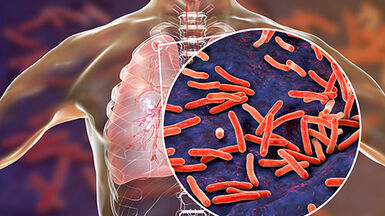Facts about botulism
Botulism is a serious paralytic illness caused by a nerve toxin produced by the bacterium Clostridium botulinum. The disease may occur after eating foods containing the toxin or due to development of the spores within the intestine of young children or within wounds.
Food botulism is the dominating form of the disease, and paralytic symptoms generally appear after an incubation period of 12–36 hours (up to several days) after consumption of the toxin-containing food. The symptoms may be very severe, and require intensive-care treatment and the administration of an anti-toxin. Even where these are available, between 5 and 10 % of the patients die.
Due to the extremely high potency of the toxin, botulism is included among the potential bio-terrorist threats. Following laboratory accidents, the toxin has also caused symptoms on inhalation, with a substantially reduced incubation period.
Symptoms
Botulism causes paralysis by affecting the nerves which allow the brain to stimulate muscles and part of the central nervous system. It initially affects the nerves in the skull and may cause blurred vision, difficulty swallowing, double vision, stammering or stuttering, vocal disturbance, drooping eyelids, facial weakness and weakness of the tongue. Weakness in the neck and arms follows, after which the respiratory and lower body muscles are affected. Respiratory problems may be severe enough to need ventilation in hospital. Other symptoms may include dry mouth, urinary problems and dysfunction of the stomach, intestines, heart and blood vessels. Patients do not usually have a fever, and have no loss of sensory functions or awareness. Botulism caught from food usually affects the stomach and intestines, causing nausea, vomiting, constipation, diarrhoea and abdominal cramps. Botulism in a wound causes inflammation around the wound, followed by low blood pressure and circulatory collapse. Patients with wound botulism often look and feel quite well before deteriorating dramatically over a few hours. Babies with botulism may have constipation, lethargy, feeding difficulties, floppy muscles, increased drooling and a weak cry.
Ways to catch botulism
Botulism spores are widespread in the environment and can be found in dust, soil, untreated water and the digestive tracts of animals and fish. Foods that have led to botulism outbreaks have included the following: meat products, such as sausage and cured ham; canned, vacuum-packed, smoked or fermented fish products; vegetables preserved by canning or stored in oil; baked potatoes; honey; and cheese. Many outbreaks have occurred due to home-preserved foods. Intestinal or infant botulism usually takes place after swallowing botulinum spores, sometimes from food, which then produce toxins in the gut. Wound botulism usually happens from inoculating botulinum spores which then grow in the inoculation wound and produce toxins.
People most at risk
Rates of botulism in the EU are generally low, with around 200 cases each year (0.03 cases per 100 000 people). The highest levels of cases over the past 10 years have been reported from Poland and Lithuania. Wound botulism in intravenous drug users is now the most common type of botulism in some European countries, such as the UK and Ireland. Infant botulism, which is very rare in Europe, usually affects children younger than two, with most being under six months old.
Diagnosis
Laboratory tests can detect botulinum toxin in faeces, serum, stomach contents, a swab from a wound or in samples from contaminated food.
Treatment
Patients need to be admitted to hospital for investigation and treatment. Botulinum antitoxin is available and reduces the length of illness and fatality rates, but may have serious side effects. Treatment can be given based on a doctor’s diagnosis of symptoms, without waiting for laboratory confirmation. Wound botulism can be treated with antibiotics and surgery to remove dead tissue.
How to avoid getting botulism
There is no routine vaccination against botulism. Care should be taken when canning food, either commercially or at home, and when preserving fish, meat and vegetables to make sure botulinum is destroyed before storage. Do not eat food from containers that are obviously bulging (which could be caused by gas from the botulinum) or containers that are damaged. Avoid tasting food that might be spoiled. Keep food that has not been completely processed in the fridge. Boiling food for ten minutes before eating it would inactivate the toxin in home-canned foods. Potential botulism cases should get urgent medical response and investigation. Prevention work with intravenous drug users is also important.
What to do if you have botulism
Person-to-person spread is unlikely but it is sensible for carers and laboratory staff to wear personal protective equipment like gloves and goggles. Patients and their contacts do not need to stay away from work if they are well enough. People who have acquired botulism from contaminated food should be asked to give a history of everything they have eaten in the past five days before they became ill, especially canned or preserved foods.
The information contained in this factsheet is intended for the purpose of general information and should not be used as a substitute for the individual expertise and judgement of healthcare professionals.




